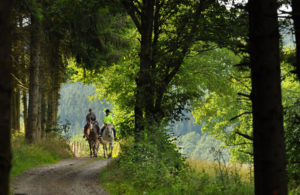For the Love of Horses: Engaging Body, Mind and Soul
The benefits of riding range from recreational to therapeutic.
Chester County is a prime location for all things equestrian. From Malvern’s historic Radnor Hunt, Unionville’s rolling hills of Plantation Field, and Devon’s blue-walled Horse Show grounds, you’d be hard pressed to find a better location for those interested in connecting with the equine world.
 With its history rich in equestrian tradition and community, this area is broadly welcoming—from established Olympic equestrians to seasoned and beginner recreational riders. And beyond the simple pleasures of trail riding, horses have been found to be immensely useful for physical fitness and rehabilitation, as well as treatment in mental health programs. Here’s a brief overview.
With its history rich in equestrian tradition and community, this area is broadly welcoming—from established Olympic equestrians to seasoned and beginner recreational riders. And beyond the simple pleasures of trail riding, horses have been found to be immensely useful for physical fitness and rehabilitation, as well as treatment in mental health programs. Here’s a brief overview.
Exercise
Many people are unaware that horseback riding is actually excellent exercise—types of riding are, after all, in the Olympics. In fact, riding helps improve reflexes, balance, coordination and flexibility, along with low-to-moderate-intensity cardio benefits. Add to that core, leg, seat and arm muscle development from steering and controlling the horse.
Chores associated with riding—lifting saddles, grooming horses, mucking out stalls—add even more exercise points. Riders enjoy a variety of benefits from improved posture and increased endurance to overall improvement of physical fitness. And riding is an accessible activity for new riders of any age and all abilities.
Treatment
Horses are a key component in a range of therapeutic riding treatments. Equine-assisted activities and therapies (EAAT) have grown in popularity due, in part, to their inclusiveness, welcoming nearly all individuals to benefit from interacting with a horse.
This approach can involve participants riding a horse, working on strength, balance and coordination, or a certified facilitator may use the horse as part of a mental health treatment while the participant is not on horseback. Treatment may also combine riding and unmounted work.
Physical benefits of horseback riding are numerous and similar to those for recreational riders. For example, horses walk in a way that resembles the human gait, causing riders to engage similar muscles that require core stability, balance and flexibility. Riding also reduces muscle spasticity as tight muscles are stretched by the horse’s movement.
Lisa Hirsch, Advanced Level Therapeutic Riding Instructor at Thorncroft Equestrian Center in Malvern, finds the approach Thorncroft specializes in very beneficial to riders with limited mobility and muscle tone. “Therapeutic riding has many physical benefits in addition to helping riders gain confidence, build self-esteem and improve social skills. The most notable physical benefits are due to using large muscle groups where core and overall strength and flexibility are improved. Riders also develop better posture, balance, coordination, fine and gross motor skills and manual dexterity,” says Hirsch.
In addition to the physical benefits, other types of treatment—such as Equine Facilitated Psychotherapy (EFP) and Equine Assisted Learning (EAL)— have been shown to be important tools for mental health and personal growth. Meeting horses on the same footing provides rich opportunities for clients to see themselves and their relationships through a new lens.
And working as a team, a licensed mental health practitioner and a certified equine specialist work alongside clients and horses to reach individual treatment goals.
Kristen de Marco, Executive Director and Equine Specialist of Gateway HorseWorks in Malvern, uses horses for mental health treatment for her human clients.
“Talk therapy can fall short for some people who have experienced trauma, are recovering from addiction, or are struggling with mental health issues. Becoming present with these large animals invites clients to connect and engage while finding their own solutions to the challenges they’re facing in their lives,” says de Marco.
These types of treatments through therapeutic riding and interaction with horses have also been shown to help riders improve interpersonal and socialization skills as well.
Spirit
For the everyday or occasional rider, or friend to a horse, there’s an indescribable peace that comes from being around these animals. These gentle spirits have a special ability to remain present, asking us to remain there with them. Horses welcome us no matter who we are, what we look like, or what’s happened in our past.
Horses’ innate ability to tune in to our most subtle emotions challenges us to identify and confront stress, conflict or even trauma, and then to reflect. It’s this ability to mirror us, without judging, that creates a unique bond.
Warmer months offer a perfect time to visit your local barns to learn more about horseback riding.
Whether you’re searching for a new activity to improve your fitness or seeking physical or mental health treatments, our area offers a wealth of opportunities.
Carole Laulis is a lifelong equestrian and Path Intl. Certified Therapeutic Riding Instructor and Volunteer Coordinator at Thorncroft. Maddie Iacobucci is Thorncroft’s Media & Special Events Coordinator and an Area II eventer and volunteer. A premier equestrian center specializing in therapeutic riding for those with and without disabilities, Thorncroft will mark its 50th year of providing life-changing services. 610-644-1963; Thorncroft.org. Find EAAT certified centers at PathIntl.org or Eagala.org.
